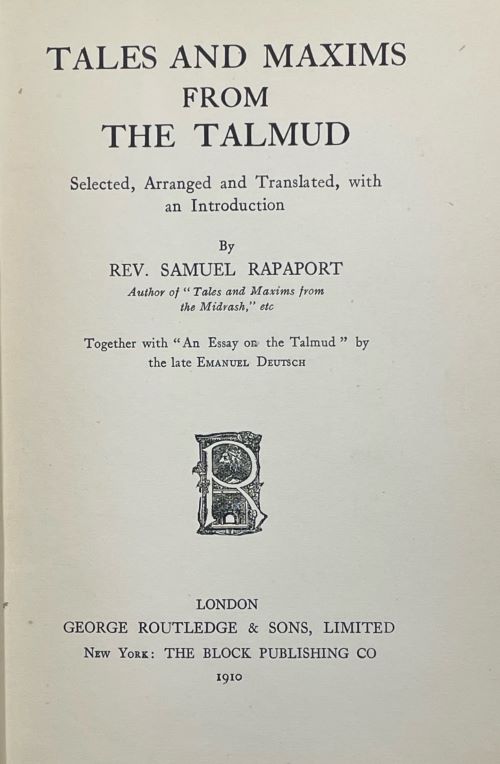I'm currently reading the Talmud--a record of more than 600 years worth of rabbinic teaching, commentary, debate, and discussion) at the rate of one Hebrew page a day. (I'm reading it in English, which works out to about 5 pages per day. I am eternally behind.) At this rate, reading the Talmud is an approximately 7 1/2 year project. That makes Pierre Goodrich's single slim 1910 volume of Tales and Maxims from the Talmud a particularly entertaining contrast with the full 42 volumes comprising the most recent scholarly translation of the full Talmud.
The Reading Room
Tales and Maxims from the Talmud: From the Liberty Fund Rare Book Room
But there's a long history of pulling the most intriguing bits out of the Talmud for learning and for pleasure. The rabbis whose legal debates on law make up the bulk of the Talmud often pause in their detailed legal discussions to tell illustrative stories, legends, and even a little gossip. This aggadah (story-telling) often makes for great reading, and it is what makes up most of Goodrich's copy of Talmudic excerpts. 
Among the many possible subject that could have attracted Goodrich's attention in this collection, he seems to have been particularly drawn to the maxims that have to do with work, and particularly with the importance of doing work to support yourself rather than relying on others to do it.
And with the--possibly surprising to some--argument that supporting yourself with your own work and acquiring knowledge in your spare time is morally superior to spending all your time learning.

The passages he marked seem to me to accord well both with Goodrich's attentiveness to his businesses and with his attentiveness to the life of the mind and the soul.For those of you who are preparing to celebrate, Chag Sameach and Happy Hanukkah from all of us at the Reading Room!

Among the many possible subject that could have attracted Goodrich's attention in this collection, he seems to have been particularly drawn to the maxims that have to do with work, and particularly with the importance of doing work to support yourself rather than relying on others to do it.

And with the--possibly surprising to some--argument that supporting yourself with your own work and acquiring knowledge in your spare time is morally superior to spending all your time learning.

The passages he marked seem to me to accord well both with Goodrich's attentiveness to his businesses and with his attentiveness to the life of the mind and the soul.For those of you who are preparing to celebrate, Chag Sameach and Happy Hanukkah from all of us at the Reading Room!